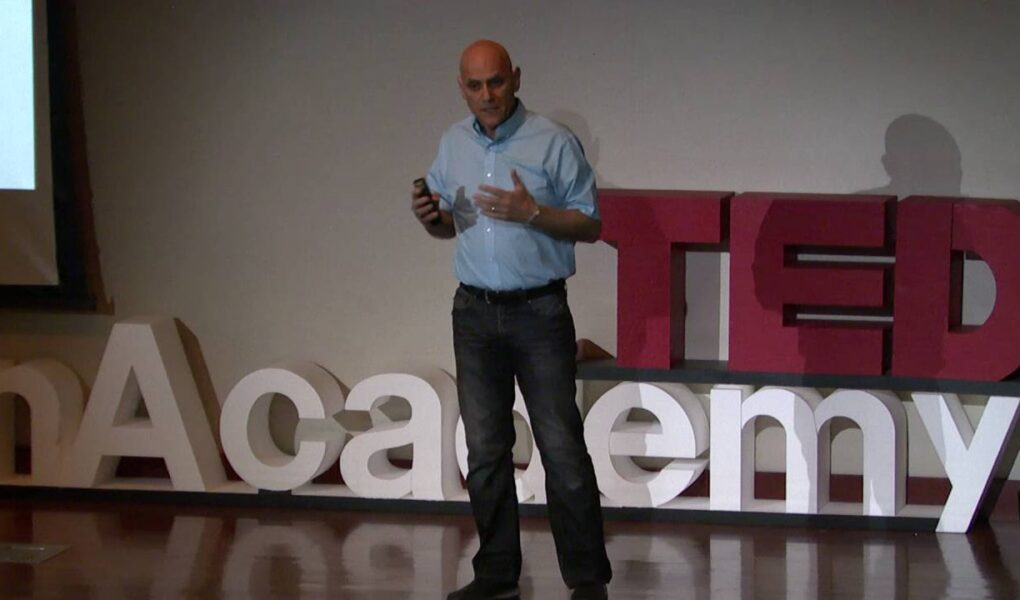TEDx Talks
How can we best deal with difficult or negative thoughts? Dr. Steven Hayes discusses language, cognition, and the science behind putting on the mental brakes.
Steven C. Hayes is Nevada Foundation Professor at the Department of Psychology at the University of Nevada. An author of 41 books and more than 575 scientific articles, he has shown in his research how language and thought leads to human suffering, and has developed “Acceptance and Commitment Therapy” a powerful therapy method that is useful in a wide variety of areas. His popular book “Get Out of Your Mind and Into Your Life” was featured in Time Magazine among several other major media outlets and for a time was the number one best selling self-help book in the United States. Dr. Hayes has been President of several scientific societies and has received several national awards, such as the Lifetime Achievement Award from the Association for Behavioral and Cognitive Therapy.
This talk was given at a TEDx event using the TED conference format but independently organized by a local community. Learn more at http://ted.com/tedx
Source




Tools for mental brakes:
The main idea is to create a sense of separation.
1. Mindfulness; pin your thoughts on clouds or cars, which are passing by
2. Give your mind a name; it's a way of creating distance from the narrative of mind.
3. Repeat the negative word really fast for 30 seconds. The word will lose its meaning. It's opposite of deja vu – jamais vu.
4. Give the mental narrative a funny voice
5. Sing the mental narrative
6. Write the thought or adjective on your tshirt or desktop background
7. Imagine yourself as a little child saying it
Thank you!
um presente
❤❤❤
TRUMP RX?
Again, I wonder if Dr. Steve could help us break free from TRUMPISM, now
Seriously, maybe we need some of this silliness medicine to escape from Trump, now
He should have played in Wednesday as Uncle Fester!
No, matter how many times I say “milk”, it does not change how I think, feel, believe about milk in any way. Nor does naming my mind, “George” change how i relate to my brain. Complete psychobabble gobbledegook.
"Hold the paper up to the light. Some waves pass right through." -Talking Heads
Absolutely beautiful presentation. Thanks Steven Hayes, this gives us hope and the motivation to get unstuck.
My therapist assigned me this TEDTalk. I’ve been working through some really rough stuff and my time in counseling is in its infancy. I was not ready for the breakthrough I would have at the end of the video and I can’t wait to share. My younger self would be both excited and appalled with me. Excited because of where I am and appalled that I ever even have the inkling of an idea that I am not doing the best I can. I bawled like a baby. This was fantastic
Great and helpful talk from a true great- in Steven C Hayes❤
4:56 He said "Doo-doo." 😅
What a LOVING, CARING, & *BEAUTIFULLY-GIFTED speaker this man is!! I'm blown away by his ability to make such difficult & complex issues so easily understood! Those 30 years of dedication are some of
THE MOST VALUABLE IN HISTORY in regards to the knowledge & compassion that he has brought to humanity!
With love & *deep respect! …
THANK you Sir!
Dr. Steven Hayes, you are phenomenal! ❤ Thanks for helping me especially for putting the mental brake! Best ever!!🎉
Excellent. Thanks Steve 🙏
"Cats and dogs can't do that."
Billi: "MAD"
🌼🌼🌼🌼🌼🌼
Tools for mental brakes:
1. Mindfulness; observe your thoughts as if they are clouds passing by.
2. Give your mind a name; it's a way of creating distance from the narrative of mind.
3. Repeat the negative word really fast for 30 seconds. The word will lose its meaning. It's opposite of deja vu – jamais vu.
4. Give the mental narrative a funny voice; the main idea is to create a sense of separation.
When he was talking about remembering 123, I realised I just lost the game. 😊
Did not care for the old-man-imitation. I think this was trite babbling and not entertaining except for an 8-year-old.
I am not my thoughts and I don't have to defend them.
During the talk I was already feeling better, even without yet trying it out. It's good to have hope.
“Our secrets are the same secrets”
“Give your mind a name.” Brilliant
thank you!
Thank you Sir.
He seems so sweet
I absolutely looooove this!!! Best TED Talk I’ve ever seen. Your video will help me help others for sure. Thank you💛
Self-help and Behavioral Health recovery 101: We are not our thoughts. Beautiful and illuminating speech. Thank you, Dr. Steven Hayes.
your amzing
I had to wait 6 years and a lot of searching to find this perfectly timed video. Thank you, 1 2 3, $10,000? LOL
They've offered Royalties on ideas but it doesn't mean its cost effective for low income high interest individuals.
From a plumber to army man to astronaut to psychologist, this man has impressive skills.
😍😍👌👌
thank you george
This talk by Gordon Craven is brilliant
I really enjoyed this!
Thank you VERY MUCH ! Works like a charm
He sounds a LOT like Adam West
Thank you for Acceptance Commitment Therapy (ACT). I tried various cognitive behavioral therapy (CBT), but they did more harm than good in stressful situations. I ended up fusing my thoughts so often I trained myself to have general anxiety disorder and panic attacks. ACT and a few other things helped me reduce and eliminate panic.
You do fantastic science that saves lives and helps recover from mental suffering.
Genius! Amazing talk